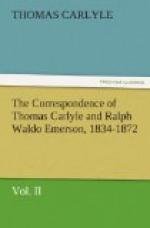Namely, that they wanted (the Wiley & Putnam house did) to publish certain other Books of mine, the List of which I do not now recollect; under similar conditions: viz. that I was to certify, in a line or two prefixable to each Book, that I had read it over in preparation for their Printer, and did authorize them to print and sell it;—in return for which Ten percent on the sale-price (and all manner of facilities, volunteered to convince even Clark of Boston, the Lynx-eyed Friend now busy for me looking through millstones, that all was straight, and said Ten percent actually paid on every copy sold); This was Putnam’s Offer, stated with all transparency, and in a way not to be misunderstood by either of us.
To which I answered that the terms seemed clear and square and every way good, and such as I could comply with heartily,—so far as I was at liberty, but not farther. Not farther: for example, there was Hart of Philadelphia (I think the Wileys do not want the Miscellanies), there were Munroe, Little and Brown, &c.;— in short, there was R.W. Emerson, who knew in all ways how far I was free and not free, and who would take care of my integrity and interest at once, and do what was just and prudent; and to him I would refer the whole question, and whatever he engaged for, that and no other than that I would do. So that you see how it is, and what a coil you have again got into! Mr. Putnam would have had some “Letter,” some “exchange of Letters,” to the effect above-stated: but I answered, “It was better we did not write at all till the matter was clear and liquid with you, and then we could very swiftly write,—and act. I would apprise you how the matter stood, and expect your answer, and bid you covenant with Mr. Wiley what you found good, prompt I to fulfil whatever you undertook for me.”—This is a true picture of the affair, the very truest I can write in haste; and so I leave it with you— Ach Gott!




